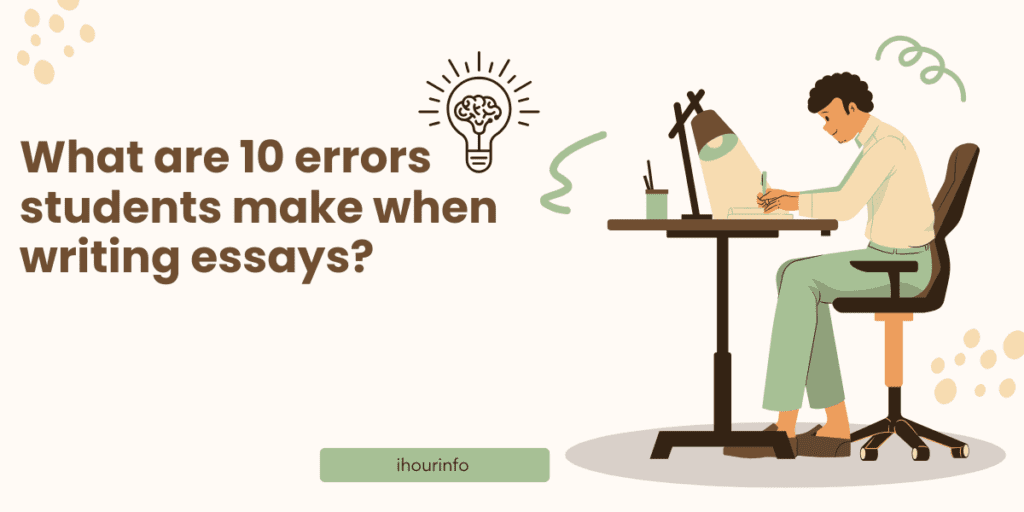
Mastering the art of essay writing is an essential skill for students across various academic disciplines. However, several common errors can hinder the effectiveness of their written work. This article aims to identify and address ten prevalent mistakes students make when crafting essays. From structural issues to grammatical pitfalls, understanding these errors is crucial for improving the overall quality of academic writing. By exploring each mistake and providing actionable insights, this guide seeks to empower students to enhance their essay writing skills and produce more compelling and impactful written assignments. For those facing time constraints or seeking additional support, services like “write my essay fast” can be valuable resources. These services offer efficient and professional assistance, ensuring students meet tight deadlines without compromising the quality of their work.
1. Lack of Clear Thesis Statement
One common mistake students make is failing to establish a clear and concise thesis statement. A thesis serves as the central argument or main point of the essay, providing a roadmap for the reader. Without a well-defined thesis, the essay may lack direction and coherence. Students should ensure their thesis statements are specific, debatable, and relevant to the essay prompt, guiding the development of the entire piece.
2. Inadequate Planning and Organization
Poor planning and organization can undermine the effectiveness of an essay. Some students may dive into writing without a structured outline, leading to a disjointed and confusing narrative. A well-organized essay should have a logical flow of ideas, with each paragraph contributing to the overall argument. Taking the time to outline key points and organize thoughts before writing ensures a more coherent and compelling essay.
3. Weak Topic Sentences and Transitions
Effective communication within an essay relies on strong topic sentences and smooth transitions between paragraphs. Weak or unclear topic sentences can leave readers confused about the main point of each paragraph. Additionally, abrupt transitions hinder the flow of ideas. Students should focus on crafting clear and assertive topic sentences, ensuring each paragraph seamlessly connects to the next to maintain a cohesive narrative.
4. Overreliance on Passive Voice
Overusing passive voice is a common stylistic mistake that can weaken the impact of an essay. Passive constructions can make sentences less direct and concise. Students should strive to use active voice whenever possible to convey a sense of immediacy and engagement. By maintaining a balance between passive and active constructions, essays become more dynamic and compelling.
5. Inadequate Revision and Proofreading
Failing to revise and proofread thoroughly is a significant oversight that can result in overlooked errors and inconsistencies. Students often submit essays without taking the time to review their work critically. By dedicating time to revising and proofreading, students can identify and rectify grammatical mistakes, improve sentence structure, and ensure the overall clarity and coherence of their writing. As for academic support, students may find valuable assistance through dissertation and thesis writing services. These services offer expert guidance in refining and polishing written work, ensuring that the final product meets the highest standards of academic excellence.
6. Lack of Depth in Analysis
Another common error is the lack of depth in the analysis of supporting evidence. Students may present evidence without thoroughly explaining its relevance to the thesis or providing meaningful insights. A successful essay requires in-depth analysis and interpretation of evidence, demonstrating the student’s understanding of the topic and contributing to a more persuasive argument.
7. Ignoring Citation and Referencing Guidelines
Failure to adhere to proper citation and referencing guidelines is a critical mistake that can lead to accusations of plagiarism. Students often overlook the importance of citing sources correctly, whether through in-text citations or a bibliography. Understanding and implementing the required citation style, whether APA, MLA, or Chicago, is essential to academic integrity and the overall quality of the essay.
In conclusion, recognizing and addressing these common mistakes is essential for students looking to enhance their essay writing skills. From crafting a clear thesis statement to ensuring proper citation and referencing, each aspect plays a crucial role in the success of an essay. By actively working to avoid these errors and implementing the suggested improvements, students can elevate the quality of their written assignments, ultimately contributing to their academic success.
Furthermore, cultivating a continuous learning mindset is imperative for sustained improvement in essay writing. Rather than viewing mistakes as setbacks, students should approach them as valuable opportunities for growth. Actively seeking feedback from peers, instructors, or utilizing writing resources can provide fresh perspectives and insights. Embracing a proactive approach to refining writing skills ensures a continual evolution of one’s abilities. With each essay, students have the chance to implement lessons learned, refine their techniques, and gradually develop a more sophisticated and effective writing style. Ultimately, the journey toward mastery in essay writing is marked by a commitment to ongoing improvement, where each mistake becomes a stepping stone toward academic excellence.



